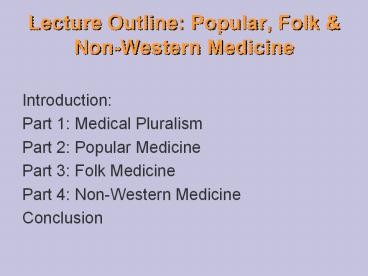Lecture Outline: Popular, Folk - PowerPoint PPT Presentation
Title:
Lecture Outline: Popular, Folk
Description:
Lecture Outline: Popular, Folk & Non-Western Medicine Introduction: Part 1: Medical Pluralism Part 2: Popular Medicine Part 3: Folk Medicine Part 4: Non-Western Medicine – PowerPoint PPT presentation
Number of Views:241
Avg rating:3.0/5.0
Title: Lecture Outline: Popular, Folk
1
Lecture Outline Popular, Folk Non-Western
Medicine
- Introduction
- Part 1 Medical Pluralism
- Part 2 Popular Medicine
- Part 3 Folk Medicine
- Part 4 Non-Western Medicine
- Conclusion
2
Introduction
- Beyond biomedicine
- Western perceptions of folk non-western
medicine - Mind-body modalities expert lay knowledge
- Medical Pluralism
3
Introduction
- Asclepius, Greek god of medicine
interventionist health through correcting
imperfections - Hygeia, Greek goddess of health prevention of
disease health education health as the natural
order
4
Introduction
- 19th century holistic health
- 20th century rise of allopathic medicine
- Late 20th interest in non-Western complementary
therapies
5
Medical Pluralism
6
Medical Pluralism
- multiple medical cultures
- health consumerism popular folk sectors,
alternative therapies, biomedicine - medical pluralism in a global age
7
Medical Pluralism
- Galenic Medicine dominant in west to 19th Century
- Humoral Theory - balance of body humours -
healing through diet, medicine blood-letting - Humoral models popular culture
8
Popular Medicine
- informal health care networks
- lay experts lay literature
- 90 health care in family setting
- role of women
9
Popular Medicine
- hierarchies of resort
- over the counter medicines
- traditional folk remedies
- diet behaviour
- faith healing
10
Folk Medicine
- intermediate position
- place in non-industrial, non-Western societies
- secular technical experts, i.e. bone-setters,
herbalists, spiritual healers
11
Ive heard stories of how she would ride or
drive horses day or night to help the sick or
needy. Many babies were delivered by her before
the arrival of a doctor in this country and even
after they came. In 1915, when dysentery swept
through this area she was credited with saving
many lives. It didnt matter if it was an animal
or human being in need of medical or dental help
she would do her best. (Mrs) Kate Edwards
Aunt Kate Peace River Region, BC, Early 20th
Century
12
Folk Medicine
- holistic
- informal training
- practitioners chosen
- empirical base complex understandings
13
Non-Western Medicine
- Indian Ayurvedic Chinese Medicine
- individual family
- healer patient
- rejection of body as a machine model
- holistic mind body
14
Ayurvedic Medicine
- mystical principles, observation, extensive
pharmacopoeia - 5 elements earth, water, fire, air, space
- 3 dosas Vata Pitta Kapha
15
Ayurvedic Medicine
16
Chinese Medicine
- established 3000 years ago
- revived under Communist regime - global influence
- chronic disorders pain
- pharmacology
17
Chinese Medicine
- oppositional elements (female/cold/chronic)
yang (male/hot/acute) - natural elements seasons
- yin/yang imbalance
18
Chinese Medicine
- comprehensive
- extensive pharmacopoeia food cures
- specialists, i.e. bonesetters, acupuncturists
- spirit mediums, astrologists, specialists in
mental illness
19
Conclusion
- non-western therapies chronic disease
- economically viability
- trans-cultural model?
20
Conclusion
- 1978 WHO directive re traditional healers
- collaborations birth, mental health, HIV/AIDS
prevention - 1998 - 22 African countries researching
indigenous medicine 17 countries cultivating
medicinal plant reserves































